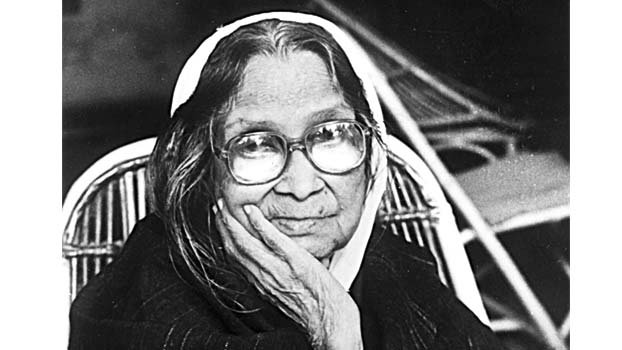Tribute to Begum Sufia Kamal

Begum Sufia Kamal was a popular Bengali poet and political activist who is considered as the pioneer of the feminist movement in the country. She had a huge contribution during the liberation war of Bangladesh, from her house medicine and food were given to the freedom fighters. Sufia is the first woman of the country whom given a state funeral at her death in 1999.
Early life
Kamal was born in Shaestabad, Barisal to a Zamindar family. During her childhood, women's education was prohibited and she could not afford to get academic education. But from her house tutors she learned Bengali, Hindi, English, Urdu, Arabic, Kurdish and Persian. In 1918, she went to Kolkata with her mother where she came to meet with Begum Rokeya. She was first married at the age of 11 to her cousin Syed Nehal Hossain, then a law student. They had a daughter, Amena Kahar. Hossain died in 1932. Five years later, Sufia married Kamaluddin Ahmed. Kamal later had two other daughters, Sultana Kamal and Saida Kamal, and two sons Shahed Kamal and Sajed Kamal.
In 1925, Kamal met Mahatma Gandhi, which inspired her to wear simple clothing. Kamal's first poem, Bashanti (Of Spring), was published in Saogat magazine in 1926. In 1931 she became the first Bengali Muslim female to be a member of the Indian Women Federation.
Literature
A short story Shainik Bodhu which Kamal wrote was published in a local paper in 1923. In 1937, she published her first collection of short stories, Keyar Kanta (Thorns of the Keya Tree). Her literary career took off after her first poetry publication. Her first book of poems, Sanjher Maya (Evening Enchantment), came out in 1938, bearing a foreword from Kazi Nazrul Islam and attracting praise from Rabindranath Tagore.
Sufia Kamal was a major literary figure. Known lovingly as 'Khalamma' (Aunt), she was also perhaps the single most honoured personality of the last decades of the twentieth century. Even when she was frail with age, she continued to be a source of inspiration, guidance and hope to political activists and poets. In her writing and the social causes that she upheld, she propounded humane and democratic values and continued to be the voice of conscience, protest and social justice.
Author of more than a dozen volumes of poetry, Sufia Kamal also wrote an autobiographical volume about her girlhood and her work with Roquiah Sakhawat Hossain, Ekale Amader Kal (In This Time, Our Time, 1988). She also wrote several volumes of short stories, beginning with Keyar Kanta (Thorns of the Keya Tree, 1937), short novels, travelogues, etc. Her poems have been translated into Chinese, English, German, Italian, Polish, Russian, Vietnamese, Hindi and Urdu. The fullest representation of her work in translation so far has been in Russian. In 1984, a Russian translation by Kama Ivanova of her first book of poetry, Sanjher Maya was published in the Soviet Union. A few of her poems have been published in journals and magazines in the United States. In 2001, the bangla academy published Mother of Pearls and Other Poems, an English translation of some of her most famous poems and in 2002 Sufia Kamaler Rachana Samagra.
Sufia Kamal's poems have a wide range of themes. The feminism of 'Sukti', in which the oyster describes how she engenders a pearl, juxtaposes the quiet thoughtfulness of 'Sanjher Maya', the title poem of her first volume; the wrongs committed by European imperialists in Africa in 'Karantarale Jamila (Jamila in Prison) echo the wrongs committed by Pakistani armies in Bengal in 'Amantran' (Invitation). Sufia Kamal's poetry draws from the rich tradition of bangla literature which has its roots in ancient Indian mythology as much as it does from the Persian and Urdu poetry which she learned as a child. Rooted in Bengal, she nevertheless ranges across the globe, eulogising Nelson Mandela, describing spring in Moscow, musing at the contradictions of America.
Activism
In 1947, when "Shaptahik Begum" was first published, Kamal became its first editor. In October of that year after the partition of India she came to Dhaka. During a huge clash between Hindu and Muslim of that time Kamal worked for their friendship and joined in Peace Committee. In 1948, when Purbo Pakistan Mohila Committee formed, she became its chairman. Kamal's activism continued in 1952, with the Language Movement. In 1961, when the Pakistani government banned Rabindra Sangeet (Songs of Rabindranath), she became involved in the movement among Bengalis that ensued in 1961. During the mass uprising in 1969, which demanded the resignation of General Ayub Khan, she promoted the cause by forming Mohila Sangram Parishad (Women's Struggle Group).
In later life, she made women's rights her top priority and headed Bangladesh's largest women's organisation, Mahila Parishad, for many years. She did not see the oppression of women as mainly a class issue. She was also the first Chairperson of BRAC (1972–1980).
Kamal was instrumental in getting the first women's dormitory of Dhaka University to be named Rokeya Hall, after Begum Rokeya.
Awards
Sufia Kamal received nearly fifty major awards, including the Tamgha-i-Imtiaz (1961), a major national award conferred by the Pakistani government, but which Sufia Kamal returned in 1969 in protest at the government's oppressive treatment of Bengalis, the Bangla Academy Award for Literature (1962), Ekushey Padak (1976), Nasiruddin Gold Medal (1977), Muktadhara Puraskar (1982), Jatiya Kavita Parishad Award (1995), Women's Federation for World Peace Crest (1996), Begum Rokeya Padak (1996), Deshbandhu CR Das Gold Medal (1996), and Independence Day Award (1997). She also received a number of international awards, among them the Lenin Centenary Jubilee Medal from the Soviet Union in 1970, and the Czechoslovakia Medal in 1986. Sufia Kamal died in Dhaka on 20 November 1999.



